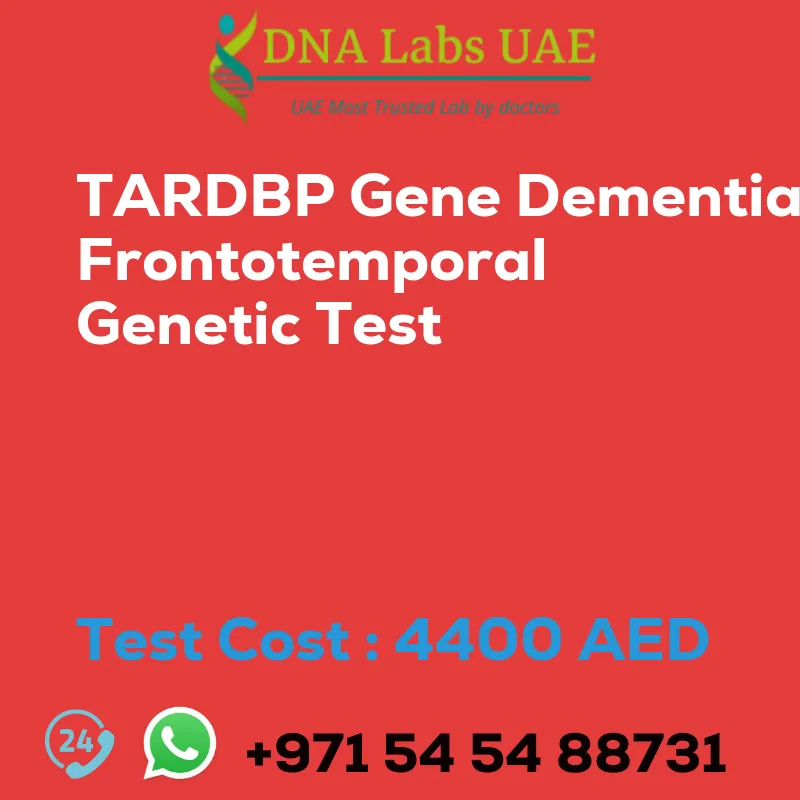TARDBP Gene Dementia Frontotemporal Genetic Test
Are you concerned about your risk of developing frontotemporal dementia (FTD)? DNA Labs UAE offers the TARDBP Gene Dementia Frontotemporal Genetic Test to provide you with valuable insights into your genetic predisposition for this neurodegenerative disorder.
Test Components and Price
The TARDBP Gene Dementia Frontotemporal Genetic Test is priced at 4400.0 AED. The test requires a blood sample, extracted DNA, or one drop of blood on an FTA card.
Report Delivery and Test Method
After providing your sample, you can expect to receive your test results within 3 to 4 weeks. The test utilizes NGS (next-generation sequencing) technology, a high-throughput method for efficiently sequencing large amounts of DNA.
Test Type and Doctor
The TARDBP Gene Dementia Frontotemporal Genetic Test falls under the category of neurological disorders. It is recommended to consult with a neurologist before undergoing the test.
Test Department and Pre-Test Information
The TARDBP Gene Dementia Frontotemporal Genetic Test is conducted by the Genetics department. Before taking the test, it is important to provide a clinical history of the patient and undergo a genetic counseling session. The genetic counselor will assist in drawing a pedigree chart of family members affected by TARDBP Gene Dementia Frontotemporal.
About TARDBP Gene Dementia and NGS Genetic Testing
The TARDBP gene is associated with frontotemporal dementia (FTD), a condition that affects the frontal and temporal lobes of the brain. FTD is characterized by changes in behavior, personality, language, and can also cause movement problems.
NGS genetic testing is a powerful tool used to identify mutations in the TARDBP gene that may increase an individual’s risk of developing FTD. However, it’s important to note that not all individuals with mutations in this gene will develop the disease. Age and environmental factors also play a role in FTD development.
Genetic testing is particularly beneficial for individuals with a family history of FTD or those experiencing symptoms. It can also aid in the diagnosis of FTD in individuals already displaying symptoms. Before undergoing genetic testing, it is strongly advised to consult with a genetic counselor or healthcare provider who can provide comprehensive information about the benefits and risks of testing and offer support throughout the process.
| Test Name | TARDBP Gene Dementia frontotemporal Genetic Test |
|---|---|
| Components | |
| Price | 4400.0 AED |
| Sample Condition | Blood or Extracted DNA or One drop Blood on FTA Card o |
| Report Delivery | 3 to 4 Weeks |
| Method | NGS Technology |
| Test type | Neurological Disorders |
| Doctor | Neurologist |
| Test Department: | Genetics |
| Pre Test Information | Clinical History of Patient who is going for TARDBP Gene Dementia, frontotemporal NGS Genetic DNA Test A Genetic Counselling session to draw a pedigree chart of family members affected with TARDBP Gene Dementia, frontotemporal |
| Test Details |
The TARDBP gene is associated with frontotemporal dementia (FTD), a neurodegenerative disorder that affects the frontal and temporal lobes of the brain. FTD is characterized by changes in behavior, personality, and language, and can also cause movement problems. NGS (next-generation sequencing) genetic testing is a type of genetic testing that uses high-throughput technology to sequence large amounts of DNA quickly and efficiently. This type of testing can be used to identify mutations in the TARDBP gene that may increase a person’s risk for developing FTD. If a person is found to have a mutation in the TARDBP gene, they may be at increased risk for developing FTD. However, not all people with mutations in this gene will develop the disease, and other factors such as age and environmental factors can also play a role in the development of FTD. Genetic testing can be helpful for people who have a family history of FTD or who are experiencing symptoms of the disease. It can also be used to help diagnose FTD in people who are already showing symptoms. It is important to talk to a genetic counselor or other healthcare provider before undergoing genetic testing, as they can help explain the benefits and risks of testing and provide support throughout the testing process. |







